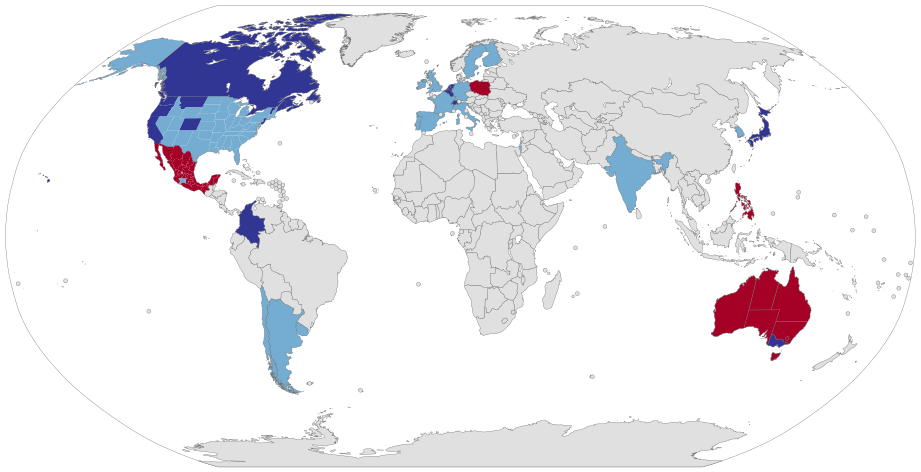New Zealand Passes Euthanasia Bill
This map depicts the legal status of euthanasia throughout the world, as of 2014. (Wikimedia Commons)
The parliament of New Zealand passed legislation to legalize voluntary euthanasia on Wednesday, November 13, reports BBC.
Under the new End of Life Choice Bill, patients diagnosed with a terminal illness and who have fewer than six months left to live will be able to initiate assisted dying procedures, upon the approval of two doctors. The bill contains a provision that it must first pass a national referendum in order to come into effect.
First proposed in 2017, the End of Life Choice Bill passed with a vote of 69-51, ending a series of eight parliamentary debates. Since its original form, Parliament has added the referendum requirement and narrowed the bill’s scope to patients projected to have fewer than six months to live. Previous versions of the bill provided for assisted dying options for individuals with severe and incurable, but not immediately terminal, conditions.
The legislation put a number of restrictions on the process of euthanization. According to the Guardian, physicians cannot suggest euthanasia to their patients and must stop the process if they feel as if the patient has been coerced. Patients also may be refused euthanasia for reasons of age, disability, or mental illness.
In addition to intense legislative debate over the bill, the New Zealand public also made nearly 40,000 submissions to the Parliament’s justice committee on the bill, setting a record for the most comments ever on a piece of proposed legislation in New Zealand’s history.
The New Zealand Herald noted that more than 90 percent of public comments on the bill were raised in opposition to legalization, with just 8 percent in favor. The vast majority of these submissions were original, and fewer than 10 percent employed religious arguments, according to the Care Alliance’s analysis.
Despite this, a 1 News Colmar Brunton poll found roughly 72 percent of the 1,000 New Zealanders surveyed were in favor of legalizing euthanasia. The 1 News poll highlighted recent substantial increase in opposition; those against legalization, now 20 percent, increased by five percent between 2018 and 2019.
Demanded by the populist party New Zealand First (NZ First), the referendum will task the public with casting the binding vote, according to Newsweek. NZ First MP Tracey Martin said, “This is an important moment for the New Zealand public. They have never had a power like this, I believe, in their lifetime.”
Radio New Zealand reported that opponents to the referendum, including National Party MP Chris Penk, cited a lack of public knowledge about the bill’s contents, indicating that a substantial amount of the public believed the bill regarded orders not to resuscitate. New Zealand’s euthanasia bill refers to active assisted dying, and orders not to resuscitate are already legal in New Zealand’s system.
Prime Minister Jacinda Ardern has supported the End of Life Choice bill throughout the legislative process, reported the Catholic Herald. Ardern harbored reservations about the referendum provision of the bill, but prioritized the bill’s passage over any lasting concerns about public misinformation.

